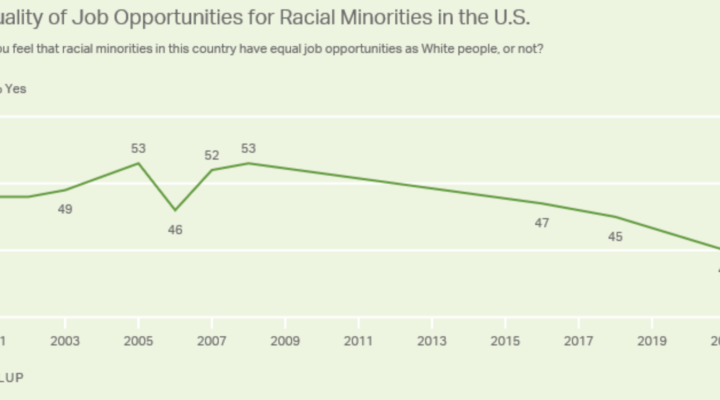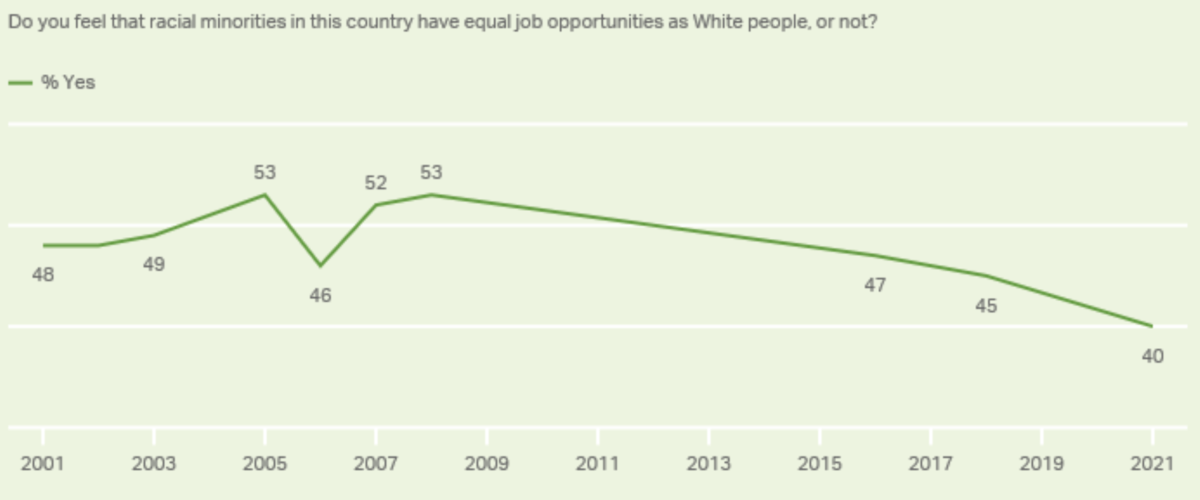Americans who contend there’s a level playing field for Blacks and whites today are in the minority of public opinion, according to new research by Gallup.
The polling firm finds a growing number of Americans believe non-white people are subject to disparities in employment and housing that whites do not face.
“Americans have become less confident in recent years that equality exists for Black people in the nation, as well as in their own community,” the polling organization said in a July 30 survey summary titled “Americans’ Confidence in Racial Fairness Waning.”
The new data points to an already-documented trend for Americans to be more positive about local than national conditions in a number of areas. On race and opportunity, a declining majority still believe Black adults have the same chance as white people in their community to get jobs or housing, while less than half (40%) perceive racial equality exists nationally.
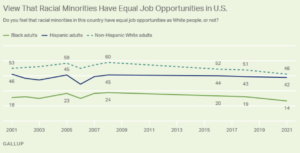 Perceptions of inequality have grown more visible since the 2020 police killing of George Floyd in Minneapolis, Gallup explained. “Americans were already becoming more skeptical following the peak of optimism in 2009 — President Barack Obama’s first year in office. In later years, particularly after 2013, public perceptions of Black-white relations began to deteriorate over several cases of unarmed Black men being killed during encounters with White police officers.”
Perceptions of inequality have grown more visible since the 2020 police killing of George Floyd in Minneapolis, Gallup explained. “Americans were already becoming more skeptical following the peak of optimism in 2009 — President Barack Obama’s first year in office. In later years, particularly after 2013, public perceptions of Black-white relations began to deteriorate over several cases of unarmed Black men being killed during encounters with White police officers.”
The survey’s release also comes in a year of hot debate over Critical Race Theory, which holds that systemic racism influences housing, hiring and other local, state and federal laws and policies.
While religious and political conservatives condemn Critical Race Theory as “socialist” doctrine, the legal theory’s development since the 1970s has illuminated facets of U.S. history and inspired the creation of affirmative action and other programs designed to generate racial equality.
Gallup’s latest minority rights and relations survey, conducted June 1 to July 15, found less certainty among U.S. adults that equal economic opportunities exist for Black Americans: “Also, less than half of Americans believe racial minorities, generally, have the same job opportunities as white people in the U.S. And six in 10 now favor affirmative action programs for racial minorities, up from less than half a decade ago.”
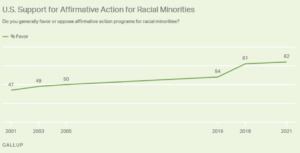 A majority of U.S. adults (55%) said they believe professionally qualified Black Americans have the same opportunities as white people to be hired for jobs in their own communities. However, that is down from 58% in 2020 and from 70% in 2011, Gallup said.
A majority of U.S. adults (55%) said they believe professionally qualified Black Americans have the same opportunities as white people to be hired for jobs in their own communities. However, that is down from 58% in 2020 and from 70% in 2011, Gallup said.
“Forty-four percent now disagree with this sentiment, in line with the 42% recorded last year but otherwise the highest since Gallup’s earliest readings, in 1963,” the report added.
A similar trend was spotted among attitudes toward fairness in housing, with 60% of survey respondents saying Black Americans have the same opportunities for affordable accommodations as whites: “While roughly the same as last year’s 63%, this is down from 67% in 2018 and around 80% from 1997 through 2015. Just under four in 10 (39%) now disagree that Black people have the same housing opportunities as white people in their community.”
Gallup found even lower confidence in workforce equality for Blacks and other non-white employees. “Separately, the poll finds less than half of Americans (40%) believing racial minorities, generally, in the country have equal job opportunities with white people, down from 45% in the last measurement in 2018 and from 53% in 2008.”
Conversely, 59% believe racial minorities do not have equal job opportunities, a majority that has increased from 52% in 2016 and 54% in 2018, Gallup said.
Survey responses broken down by ethnicity revealed gaps in answers.
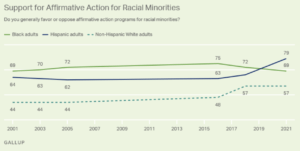 “Majorities of white Americans — now 61% — contrasted with less than half of Black Americans (now 31%), believe that Black people have the same chance as white people to get a job in their community,” the researchers said.
“Majorities of white Americans — now 61% — contrasted with less than half of Black Americans (now 31%), believe that Black people have the same chance as white people to get a job in their community,” the researchers said.
Hispanic Americans have tended to be closer to Caucasian views on these issues since 2004, when their views began to be tracked. “As with white adults, a majority of Hispanic adults believe that equal housing opportunity exists for Black people in their community, but this declined from 77% in 2013 to 63% today.”
During that stretch, Gallup said it also has tracked 20-percentage-point declines in the rate of Black and white Americans who believe equal housing exists for Black people in their communities. “Belief in this has declined from 85% to 65% over this period among white adults and from 56% to 36% among Black adults.”
The survey picked up an overall increase in support for affirmative action programs for racial minorities, with 62% — the same percentage seen in 2018 — in favor. “But this is up from 54% in 2016 and is the highest in the trend since 2001. In that initial measure, 47% favored it.”
Analyzed by race, Gallup said support for affirmative action has jumped among white and Hispanic adults since 2016 to 57% and 79%, respectively.
Support for affirmative action has jumped among white and Hispanic adults since 2016 to 57% and 79%, respectively.
Previously, fewer than half of white adults and a little more than six in 10 Hispanic adults favored affirmative action. Gallup added that support for the programs declined among Black adults from 75% to 69% since 2016.
“The percentage of Black adults favoring affirmative action today is similar to what it was in the early 2000s, while the rates are significantly higher among white and Hispanic adults,” the study found.
While majorities across ethnic lines currently favor affirmative action programs, Gallup added, “one thing that hasn’t changed is the racial gap in attitudes about equal rights, with Black Americans maintaining a much more negative outlook than white Americans.”

